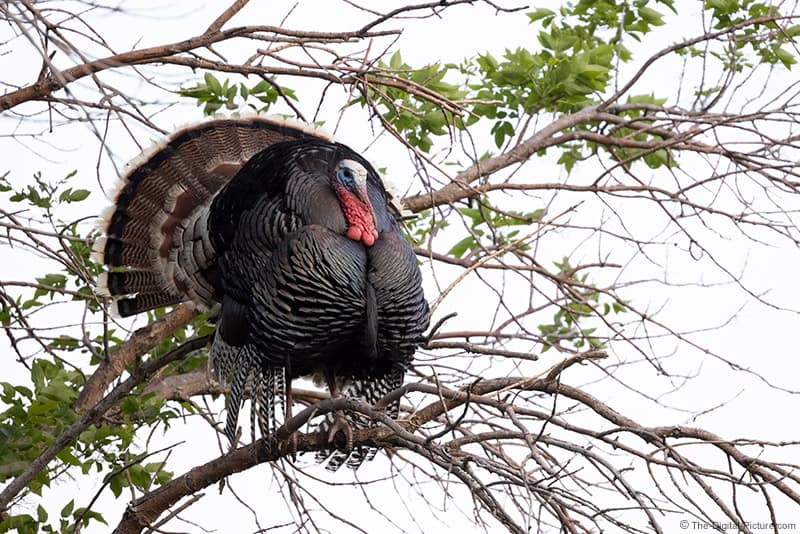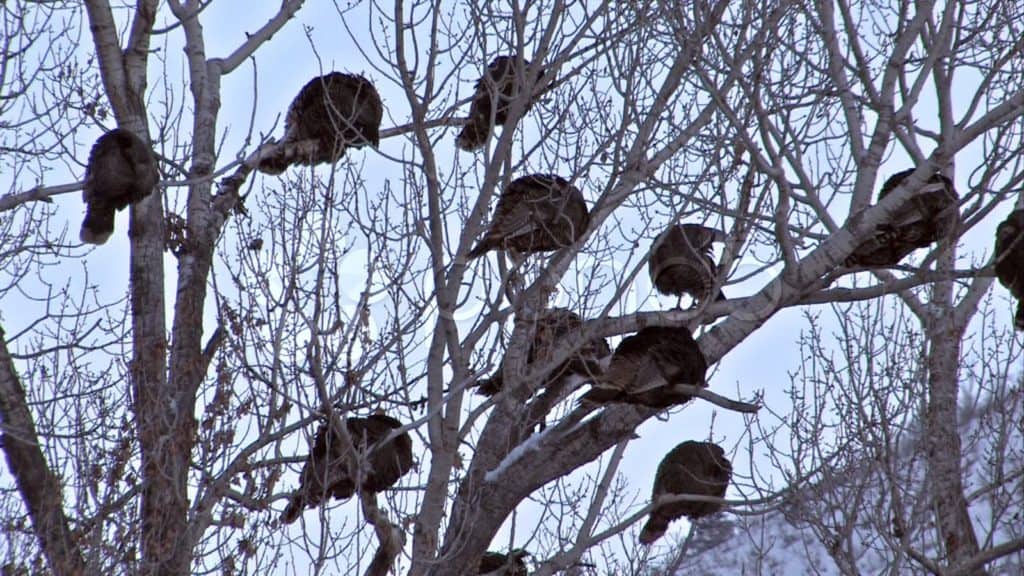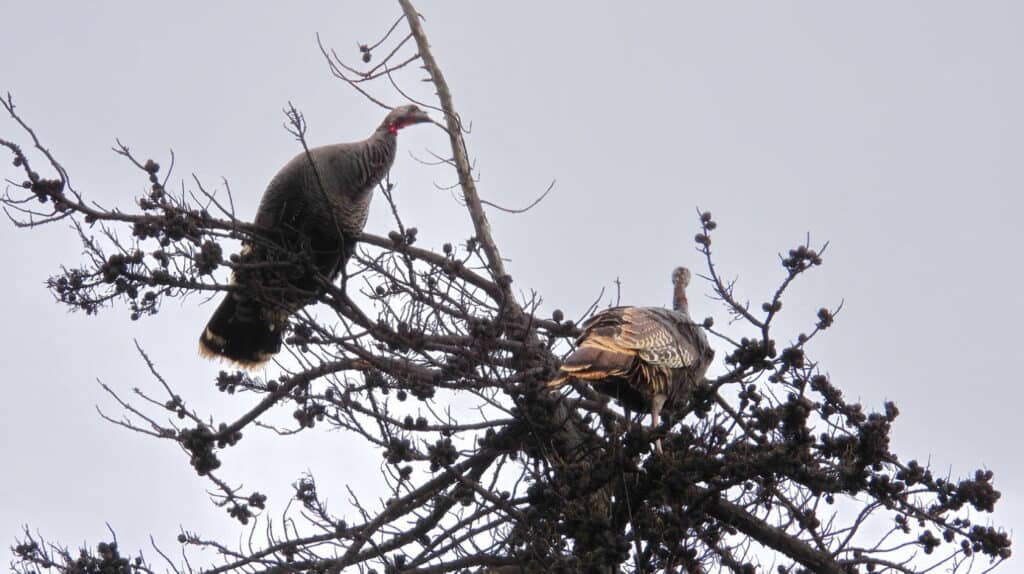As a hunter, you know that timing is essential to successful turkey hunting. Knowing when and where to find the birds is key to success. One of the most important questions for a serious turkey hunter to answer is: What time do turkeys come off the roost? It isn’t always the exact same time, and it takes a little time to figure it out on your own, but I have already done that for you.
Turkeys will fly down in the morning after first light. Weather significantly affects the actual time of fly down. Usually, they will fly down within 30 minutes of first light on a clear day whereas on a rainy or windy day, they may spend a few hours on the roost after light.
Today, I will explain what time turkeys come off the roost, what can change that time and discuss the best strategies for finding and hunting turkey roosts. Let’s jump into the initial part of turkey hunting, which is finding the roost to begin with.

How to Find Where Turkeys Roost
Spotting a roost of turkeys can be an exhilarating experience for any avid hunter, but finding the perfect spot can prove challenging. The best way to locate a turkey’s roost is by timing your hunt and paying attention to when they are most active.
Turkeys tend to fly up into the trees in the evening and they will remain there until morning. If you want to find where they’re roosting, make sure you head outside sometime between dusk and when the sun comes up, and keep your ears open for turkey vocalizations.
I highly suggest that you do your scouting well in advance of turkey season starting. Turkeys are creatures of habit and usually have their favorite spots to roost during different parts of the year. Locating these and knowing some of their patterns will greatly enhance your ability to bag a turkey.
If you are unable to scout well in advance, the next option is scouting the afternoon and evening before your next morning hunt. If you can locate your target group of turkeys heading to the roost in the later afternoon and evening, then you have a good idea of where they may roost and can plan a setup location for when they fly off the roost come morning.
Once you find their current roost, there is a strong chance that they will head back to the same trees or roughly the same area. Some good things to look for when initially scouting for a roosting spot are water, field access with food opportunities, shelter from wind and predators, and especially thick timber or pine trees. If you look for these areas to begin with, along with signs of turkeys, I would venture to guess that you are on the right track.
If you want to know a bit more about finding turkey roosts, I actually wrote a whole in-depth article about it that you can read right here.
What Affects When Turkeys Leave the Roost?
I wish it were as simple as saying they come off the roost 30 minutes after sunrise, but that would be too easy. Turkeys are always changing, weather and hunting pressure make a big impact on when they choose to fly down.
Turkeys generally come off their roost anytime between dawn and mid-morning with some different factors playing pivotal roles. Timing can be changed based on weather, predators, or other factors that we may not even know about or generally consider. These are still animals that can be just as unpredictable as any other game animal.

Weather
The first factor I want to talk about is weather conditions. Weather conditions will absolutely affect when turkeys glide down from their roost. They are naturally paranoid creatures that use their vision and hearing to keep them in the know about their surroundings. Various weather conditions can cause them to stay in the roost longer because they affect their vision or hearing.
I run into a lot of foggy mornings during the spring as temperatures can range wildly from night to day. If it’s foggy in the morning, turkeys won’t fly down early because their vision is limited. Turkeys will not want to compromise their safety by coming down into a foggy situation.
Any type of inclement weather, be it fog, rain, or anything that disrupts the vision and hearing of a turkey will be enough to keep them on the roost longer than on a clear day. This is important to know when setting out to hunt. I am not telling you to hold off on being in the field early, but keep in mind that in less than ideal conditions, the turkeys more than likely will come off the roost a bit later.
Predatory Pressure
A predator in the area may have the same effect. If there are coyotes in the area or anything else that turkeys might feel threatened by, their natural instinct is to stay up in the trees where they are inaccessible. Outside of coyotes, other predators that turkeys are weary of are bobcats, foxes, raccoons, other birds of prey, and domestic animals like dogs and cats.
Predators are a serious part of a turkey’s life and their natural paranoia will keep them on the constant lookout for those predators before coming down off the roost in the morning. This is also usually the case in why they won’t come down in poor visibility or inclement weather. They simply don’t know what is out there. It is better to be safe than sorry in their case.
Hunting Pressure
Finally, some other things that will keep turkeys in their roost include the movement of people or hunters in this case, as well as loud noises or other disturbances. Anything that makes turkeys uneasy or is out of the ordinary routine of their day will keep turkeys in their roost. This is especially important to remember when hunting them. If you are the only hunter in a location you are in complete control of this factor. Many times this is not the case and I have to modify my hunting plans in reference to another hunter’s practices or regular hunting activity.

Prime Time
While there is no exact time that turkeys come down off the roost, I have given you some useful advice to gauge when they will come down. The morning is prime time for turkey hunting, right when they come down off the roost.
When the morning is clear, turkeys will be quick to come down out of their roost to get their day underway, especially during the peak of the breeding season. Be in your hunting spot before dawn and make sure you get in there stealthily. The cover of darkness will allow you to sneak in close to the roost without being detected if you are silent.
If the weather isn’t the greatest, wait it out and keep watch for the turkeys when they finally hit the ground. Don’t pack it up early because the weather isn’t perfect. You may be missing the best part of the hunt.
Getting In Position Near A Roost
So you have done your homework and used my advice about finding a good roosting spot. Maybe you scouted it the night before and found that a decent group of turkeys is roosted in a certain location. Next is to execute a plan to get into a position that puts you in range shortly after they come off the roost.
Getting into a position that is close enough to the roost to possibly see and hear the turkeys fly down is very important. However, I don’t want to be so close that I risk startling the turkeys on the roost or possibly have them blow my cover when they come down. This is why finding a location that is near the roost where the turkeys can get to an open field or the edge of timber is very important.
Having an ambush position in mind or already having a blind nestled in beforehand can be very useful. I suggest that you use the cover of darkness to get into position and be as silent as possible. Plan a good route to get to and from your turkey blind or set up location to help with a silent entry.
If you want to see a little more about using a ground blind for stealthy hunts, check out my article titled “When to Use a Ground Blind to Get a HUGE Advantage”.
Slipping into your hunting position can make or break your morning hunt right off the bat. If you are silent, there is a strong chance to make something happen right after those turkeys come off the roost. If you make a bunch of noise it might be a long wait. Turkeys will do whatever they can to head in a different direction when they are spooked. Once in position, listen and enjoy the morning.
Sun Up
Up to this point, you have done your due diligence. You have found the roost, you have snuck in silently and gotten set up and now you wait. As the sun comes up, this is when it is really important to focus your attention in the direction of the roost.
Turkeys will wait until the sun comes up and they have a clear sight picture to check out the scene below and around them before coming down out of the roost. Once the coast is clear and they feel safe, turkeys will typically glide down out of their roost. In my experience, turkeys often ruffle their wings and tend to make some subtle noise before coming down out of their roost. If you can catch this, it should be a good indicator that the hunt is on!
Last Call
Turkeys are a fun quarry to pursue in the spring, but they are not easy to harvest by any stretch. Getting into position near a roost before the turkeys fly down can be a key to harvesting a gobbler this spring and for years to come. Weather, predator pressure, and hunting pressure all play a role in the actual time that a turkey will fly down from the roost and even what it will do after leaving the roost. Do your best to accurately predict the time and direction of the fly-down and set yourself up for success.
Sister Post | How To Find A Turkey Roost
A sister post is another post that I have written that follows along with the same topic as the one you just read. After reading this article, you will probably like this next one even more! Here is a little teaser…
While turkeys can be successfully hunted at any time during the day, the most popular time to hunt them is at the crack of dawn and in states where it is legal, just before dusk…Keep Reading
The Perfect Roost
It is no secret that turkeys roost in trees. Trees provide protection from predators lurking on the ground as well as give some protection from the weather…Keep Reading
What to Look For
Like all animals, turkeys need food, water, and shelter…Keep Reading
Thank you for reading my article! I hope you enjoyed it, and if you have any questions or feedback, please send me an email at Patrick.Long@omegaoutdoors.net. If you want to learn more about me or Omega Outdoors, visit my About Page. Otherwise, I hope you have a great day, and check out some of my other articles while you’re here!
